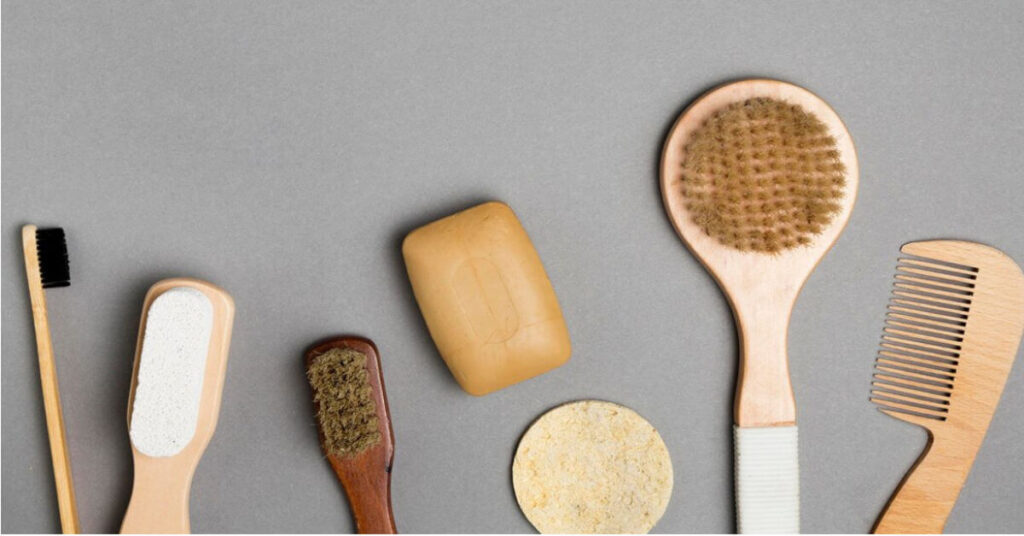If you’ve ever wandered through the haircare aisle, you are aware of how confusing it may be to select the ideal hairbrush. It’s easy to become overwhelmed by the abundance of alternatives available, which range from paddle brushes to round brushes and everything in between. However, a vital component that is sometimes disregarded is the kind of bristles your brush has.
Bristles are important for your hair’s health and beauty; they’re not just for show. Every type—natural or synthetic—offers special advantages suited to particular hair types and issues. Thus, let’s explore the world of bristles and determine which ones are most appropriate for your hair.
What are natural bristles?
Natural bristles are typically derived from animal hair, such as boar or horsehair. These bristles are known for their gentle yet effective detangling capabilities and are often favored for their ability to distribute natural oils from the scalp throughout the hair.
Benefits of natural bristles:
- Gentle on the scalp: Natural bristles are soft and gentle, making them ideal for those with sensitive scalps.
- Sebum distribution: The structure of natural bristles allows them to distribute sebum—a natural conditioning oil produced by the scalp—along the hair shaft, promoting shine and overall hair health.
- Enhanced shine: By distributing oils evenly, natural bristles can impart a healthy sheen to your strands, reducing the need for additional styling products.
Who should opt for natural bristles?
Natural bristle brushes are particularly beneficial for individuals with fine to medium hair textures, as well as those prone to scalp sensitivity or dryness.
Synthetic Bristles: Versatile and Durable
What are synthetic bristles?
Synthetic bristles are typically made from nylon or other man-made materials. These bristles are engineered to mimic the properties of natural bristles while offering added durability and versatility.
Benefits of synthetic bristles:
- Durability: Synthetic bristles are more resilient than their natural counterparts, making them suitable for rigorous brushing and styling.
- Versatility: Synthetic bristles are available in various shapes and sizes, making them suitable for a wide range of hair types and styling preferences.
- Heat resistance: Certain synthetic bristles are designed to withstand heat styling tools, making them an excellent choice for blow-drying and shaping hair.
Who should opt for synthetic bristles?
Synthetic bristle brushes are ideal for individuals with thick or coarse hair textures, as well as those who frequently use heat styling tools. They are also a practical option for anyone seeking a low-maintenance brush that can withstand daily wear and tear.
Mixed Bristles: Finding the Perfect Balance
What are mixed bristles?
Mixed bristle brushes combine both natural and synthetic bristles to offer the benefits of both worlds. These brushes often feature a combination of natural bristles for gentle detangling and synthetic bristles for added durability and styling control.
Benefits of mixed bristles:
- Combination of benefits: Mixed bristle brushes offer the gentle detangling and sebum distribution of natural bristles, coupled with the durability and versatility of synthetic bristles.
- Enhanced styling control: The inclusion of synthetic bristles provides added grip and control, making it easier to achieve desired hairstyles.
Who should opt for mixed bristles?
Mixed bristle brushes are suitable for individuals with a variety of hair types and concerns. They are particularly beneficial for those seeking a versatile brush that can address multiple styling needs without compromising on hair health.
Choosing the Right Bristles for Your Hair Type: A Step-by-Step Guide
- Assess your hair type: Determine whether your hair is fine, medium, or thick, as well as any specific concerns such as dryness or scalp sensitivity.
- Consider your styling routine: Take into account how often you use heat styling tools and the level of styling control you require.
- Evaluate your preferences: Decide whether you prefer a brush that focuses on scalp stimulation, detangling, or styling versatility.
- Research different bristle types: Familiarize yourself with the characteristics and benefits of natural, synthetic, and mixed bristles to determine which aligns best with your needs.
- Test and experiment: If possible, try out different brushes with varying bristle types to see which one feels most comfortable and effective for your hair.
Conclusion
When it comes to hair brushes, the type of bristles you choose can make a world of difference in the health and appearance of your locks. Whether you opt for the gentle touch of natural bristles, the durability of synthetic bristles, or the versatility of mixed bristles, there’s a perfect brush out there for everyone.
By understanding the unique benefits of each bristle type and considering factors such as hair type, styling routine, and personal preferences, you can make an informed decision that enhances the beauty and vitality of your hair. So, next time you’re in the market for a new hairbrush, remember to brush up on your bristle knowledge and choose wisely!


